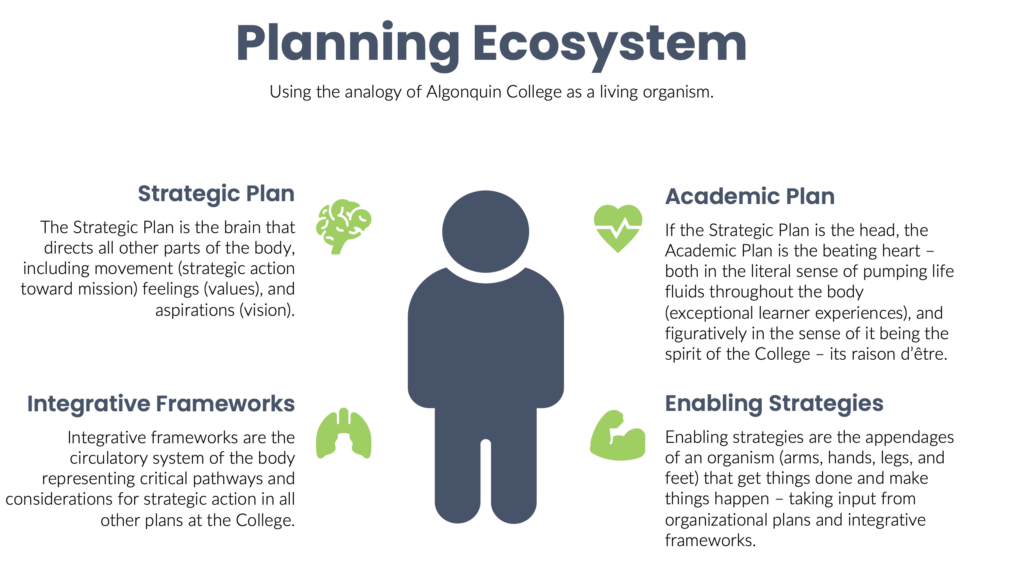Planning Ecosystem
Algonquin College is driven by its Strategic Plan.
Our actions, aspirations, and approaches are attentive to a singular mission – to transform hopes and dreams into lifelong success – through being learner-driven and people-focused. All of our efforts, as a College, are to achieve the goals, desired outcomes, and measures of success outlined in our Strategic Plan.
At Algonquin College, there are a portfolio of plans, frameworks, strategies, and tactics that we employ that represent focused planning on one or more tenets of our Strategic Plan. These plans can be broad or narrow in scope and can influence approaches across departments or within a single organizational unit. This portfolio of strategic plans at the College are broken down into the following categories: Organizational Plans, Integrative Frameworks, and Enabling Strategies.
Organizational Plans
Given the prominence of the Strategic Plan in the planning and decision-making at Algonquin College, all strategic action must demonstrate alignment to the goals and desired outcomes therein. The Strategic Plan is updated on a regular basis and forms the basis of the College’s Strategic Mandate Agreement with the Ministry of Colleges and Universities.
The College would simply not exist without our learners and that places the academic mission of the College central to the organization. As such, our Academic Plan complements our Strategic Plan by more specifically articulating how we achieve its goals, desired outcomes, and measures of success through the delivery of education and training.
Organizational plans are high-level, aspirational plans that influence the actions, approaches, and aspirations of the entire organization. Strategic actions and resource allocation are predicated on the alignment of the action to the outcomes in our organizational plans.
Integrative Frameworks
Integrative frameworks and plans require collective action across the College to achieve a more focused strategic topic – such as sustainability, internationalization, EDI (equity, diversity and inclusion), enrolment management, and Indigenization. These portfolios may be led by a particular departmental unit but require broad action to achieve its goals. Integrative frameworks focus on a particular theme in organizational plans while also influencing the enabling strategies and tactics within departments or specific portfolios.
Current integrative frameworks include the Sustainability Framework, Financial Sustainability Roadmap, Strategic Enrolment Management Plan, Enterprise Risk Management Plan, Inclusion, Diversity, Equity and Accessibility Blueprint, International Plan, Campus Master Development Plan, and Digital Strategy
Enabling Strategies
Enabling strategies tend to be tactical in nature and/or limited in scope to a single organizational unit. They primarily outline the strategies, tactics, and approaches that a specific portfolio or department employs that enable the achievement of the outcomes in organizational plans and integrative frameworks. They speak directly to an overall approach to be taken, to precise actions, and how the resources necessary to achieve them are to be managed.
Departmental and School/Institute plans would fit into this category including, Student Support Services Plan, Marketing Plan, Experiential Learning Framework, Campus Services Plan, Partnership Framework, and many others. Institutionally, there is no limit to the specificity of enabling strategies as they are used to direct the activities of departments, schools, teams, and even responsible individuals in their roles to enable higher-level strategic outcomes.
Strategic plans at the College are executed through targeted initiatives that speak directly to particular strategic outcomes and demonstrably contribute to measures of success. Planning for these initiatives are done via three project portfolios. Business Plan initiatives are strategic efforts that enhance the competitiveness of the College, addresses a key risk from the College’s Enterprise Risk Profile, and directly contribute to the achievement of goals in our Strategic Plan. They primarily require multi-year resourcing, both in terms of budget and expertise, and their implementation is overseen by the Board of Governors. Operating Plan initiatives are initiated by departments for activities that are required to fulfill essential operating requirements of the College requiring significant resources from one or more other organizational units (e.g. budget, technology, infrastructure, people). Initiatives in Departmental Plans are within the resources and span of control of a single departmental and do not rely on other College resources, including budget.
